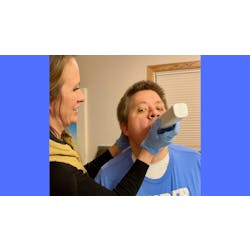By Kyle Isaacs, RDHEP, BHS
Do you want to get more patients but keep the ones you already have? Do you want to be a valuable team member in your practice, keep your position in today's competitive job market, and enjoy a progressive work environment? We all know that having great clinical skills is important, but patients want more than that: They want to have a relationship with their dental providers.1 Patients want to feel connected with the people who are caring for them. When patients are happy and the practice is successful, it is more likely that the people we work with will be happy as well. A few simple techniques can go a long way in helping you to strengthen relationships and keep the patients you already have. And with great relationships, happy patients are more likely to refer new patients so that the practice can be prosperous.
There is a lot of talk about jobs in today's dental hygiene environment-that is, finding and keeping them. Having great clinical skills is important, and for many offices, there is some sort of production goal. Sometimes that means trying to sell products-such as whitening kits, prescription fluoride, or electric toothbrushes-and of course, it also means treatment. But selling products and treatment is not the only way to achieve production goals. Acquiring and keeping new patients can help, too.
These days, many offices have digital X-rays, CAD/CAM technology, intraoral cameras, and lasers. While we all may want to say that we offer painless dentistry and high-tech equipment, these are just more ways to attract patients, and whether you have them in your office or not, remember that you cannot please everyone all of the time. Also, what people truly love-and what makes them what to return and refer their friends-are the positive connections.
The free way to build a practice
There are some simple ways to do this. Some people refer to these methods as "practice builders," or concepts and actions that aid in growing the number of patients a practice has. Practice builders do not have to cost a thing. You do not need to hire an expensive management company to help you find and keep great patients. As a dental hygienist you have the ability to "wow" both your patients and the dentist you work with.
As health-care providers, we have many opportunities to make patients feel more comfortable. Some of the more obvious ways to do this include: being friendly and warm, maintaining a clean office, being on time, having an informative website, and honing strong clinical skills. A gentle touch on the shoulder or just taking a few minutes out of your tight schedule to make eye contact and actively listen to what your patient is telling you are two more simple ways you can help patients to feel more relaxed in your chair.
I have been in the dental hygiene world for more than 30 years, and I remember when we did not have computers; it was much easier to sit at the patient's level and talk face to face. After computers were introduced into our offices, it became more difficult to do that since we often have to face the computer, rather than the patient, to see the schedule, the health history, the perio chart, and notes.
How do you look at the health history and ask questions? How do you maintain good rapport with patients so they feel heard and know they are in a practice that cares about them as people, not just as bodies that pay the bills? It can be tricky! Try to look at each patient's health history, perio chart, and notes before he or she comes in, make notes on a piece of paper and then sit in your chair facing them to ask any pertinent questions.
Put yourself in their shoes-would you like your caregiver to only look at the computer screen? I know I would not. The first few minutes can make a big difference in making patients feel comfortable in your practice and in building trust and long-term relationships.
Another way to help patients feel more comfortable is to check in with them when they're not in the office. For a long time, I believed that it was important to check on scaling-and-root-planing patients the next day, but not all offices support this practice. As a practice builder, calling patients is an easy thing to do that has huge results. At my present place of employment, the corporation asks that we make three to four calls per day.
I started by calling only the people who had seen me for scaling and root planing. When I make these calls, I say that I am checking in to see how they are doing and to find out if they have any questions or concerns. I am able to allay any concerns, and the patients are appreciative that I take the time to call. If they had any postoperative problems, I will give them the necessary advice and then call them later or the next day.
Now, I also call patients when I've just seen them for the first time to tell them it was nice to meet them and that I look forward to seeing them for their future dental hygiene appointments. I also ask if they have any questions or concerns. Also, I will sometimes call patients after introducing a new oral hygiene aid to see if they have any questions about how to use the new tool. In addition to showing that I care, it also encourages them and reinforces the need for them to use these tools.
Every patient is appreciative, and we have received emails and great Yelp reviews after the phone calls. We have even had patients mention to the assistant how much they appreciated the calls and that our caring made them feel more comfortable getting treatment. Although making the calls was scary for me at first (because I am characteristically shy), I realized the rapport between my patients and me was stronger after a while. Now, I can say that I look forward to making the calls, that the calls make the patients feel important, and that the calls offer another opportunity to connect and thus bolster patient-hygienist relationships.
There are times when a patient has a problem or a question I am unable to figure out, or times when I need to research the best product for them. It would be easy just to say, "I don't know." It would be easy to leave work for the day and not think about it until I get back to work the next day. If you want to truly help your patients beyond the operatory, you may have to spend some time at home, asking your peers in online dental hygiene groups or researching credible websites or evidence-based scientific articles for solutions. Your patients will be appreciative, you will be strengthening relationships, and it will feel great to have made a difference.
Gaining a patient's trust is key to treatment acceptance. According to Dr. Mark Hyman, asking the right questions to find out what patients' goals are will change the relationship dynamics, build trust, and allow patients to feel as though they are part of the team and as though they are equals in decision making.2 They will be less likely to feel like the dentist only wants to do treatment to make more money and more likely to feel like you genuinely care. In the past 30-plus years, the general public's trust for dentists has decreased and is now at a low of 57%.3
Dr. Donna Galante suggests that the key to building trust is asking what concerns the patient has and then actively listening and asking more questions.3 She also recommends that letting patients know that their concerns have been communicated to the doctor increases their perceptions that the team cares.3
When practice-building strategies don't work
I've seen strategies that don't work, too. In my varied clinical experience, I worked for about a year with a dentist who had hired a practice manager. We were required to ask each patient to give us the name of a friend who we could send a card to for a free prophylaxis.
I hated asking; it was the worst thing in the world. I sweated through each appointment trying to figure out how I would broach the subject without sounding false. I was never successful and dreaded going to work.
There were more tasks asked of us, but for the essence of space, I will not go there. Needless to say, none of it worked.
What works is to show your patients that you truly care. This will help strengthen those important relationships. Treat your patients like family.
A positive reaction to no-shows
There are other ways to help make patients feel that they are cared for and a part of the family. When patients are late, instead of berating them, I might say, "I am glad you are OK. I was worried when you did not show up on time." When you say something like this, you are not only showing concern, but responding to their lateness in a way that is likely to decrease bad feelings and frustration. It is amazing how we can have an effect on others by changing what we say and how we say it. Of course, there are those patients who are habitually late, but that is another topic altogether!
My tactic for dealing with late patients can be used for no-shows, too. We have all had patients who didn't show up for their appointments. What do you do when it is a new patient? Do you decide not to bother with them-that is, to write them off? It would be easy to say that they are "flakes" and either not schedule them again or maybe, at the most, give them one more chance ... but a simple phone call to check on them will give them the message that your dental office sees them as important and worthy of a call.1 We need to remember that we are all human. Wouldn't you want a second chance? I know I would.
There are all kinds of gimmicks that you can try. All over the Internet, websites are telling practices to "try this" or "try that," but frequently fail to suggest anything about building relationships. How do we make new friends? We take the time to call and get together with them. We show them that we care. Our patients want that, too, and they do not want to feel like just another body in the chair. I can tell you it works. I worked in the same practice for 26 years. I asked questions about my patients' lives; many of you know what I mean.
But don't just leave it at that. Go further than your operatory. Ask questions about your patients' concerns, listen actively, make eye contact, and make those important phone calls. Go out of your way by doing research to help with sensitive gingiva, dry mouth, alternatives to fluoride, or finding the answer to a question. These are all effective ways to build your patients' trust and strengthen those relationships. You are likely to be surprised by the big rewards you will get from these simple tasks. RDH
Kyle Isaacs, RDHEP, BHS, lives near Corvallis, Oregon, where she works four days a week in a dental office. She also owns a company, Miles 2 Smiles LLC, and provides dental hygiene care in churches, private homes, and schools. Eventually, she hopes to provide care in nursing homes as well. She is a member of the American Dental Hygienists' Association and serves on the board of her local component. She loves to volunteer and comes from a family with many dental professionals. She has been a dental hygienist for 32 years.
References
1. Farran H. Keeping and Attracting Patients: It's All About Relationships. Dentaltown. http://www.dentaltown.com/MessageBoard/thread.aspx?a=11&s=2&f=2715&t=249297&g=1&st=keeping%20and%20attracting%20patients. Published 2015.
2. Hyman M. Building Trust with a New Patient. New Dentist Now. http://newdentistblog.ada.org/wordpress/?p=1315. Published 2014.
3. Galante D. Are You Trustworthy? Dr. Donna Galante. http://www.drdonnagalante.com/are-you-a-trustworthy-dentist. Published 2015.







